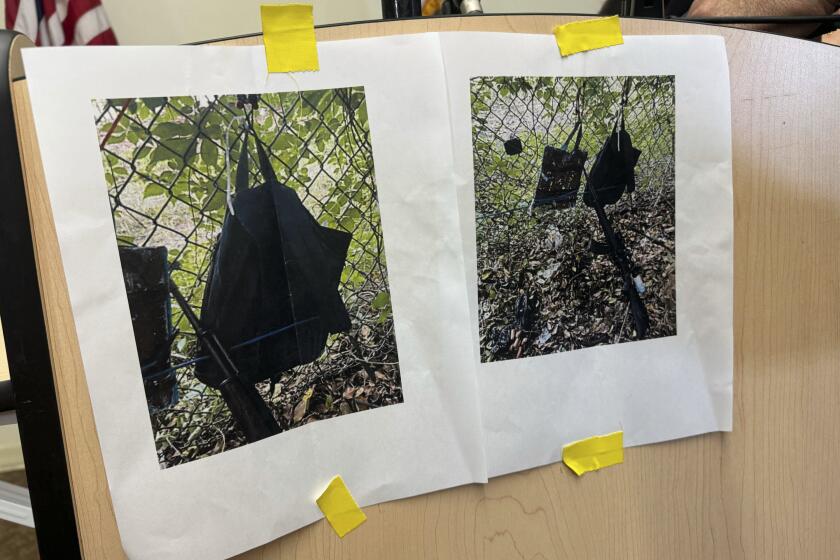Op-Ed: Letâs get our nuclear weapons out of Turkey
On Feb. 14, 1979, less than one month after the shah of Iranâs exile, the U.S. Embassy in Tehran was overrun by Iranian militants. Within hours, it was returned to U.S. hands. Now on notice that our diplomats were stationed on a vulnerable outpost in a sea of anti-Americanism, the Carter administration considered, but rejected, closing the embassy. In October, President Carter permitted the shah â despised by Iranians and the regime that replaced his â to enter the United States. Days later, Iranians climbed the embassy gates again, took the Americans there hostage and demanded the shahâs return, beginning a 444-day crisis.
There are no do-overs in history, but there are lessons. The 1979 hostage crisis should have taught us the importance of proactively responding to obvious threats and removing vulnerable targets â a lesson that should be applied now if there are U.S. nuclear weapons based in Turkey.
After a faction within the Turkish military tried to overthrow the Turkish government last month, one of the many arrested for his alleged role in the attempted coup was a commanding officer at the Incirlik Air Base. That base â according to numerous media reports â is a major NATO installation hosting one of the largest stockpiles of nuclear weapons in Europe.
What if the Turkish base commander at Incirlik had ordered his troops surrounding the perimeter of the base to turn their guns on the U.S. soldiers that reportedly guard U.S. nuclear storage bunkers there?
What if anti-American Turkish protesters, believing the U.S. was behind the coup plot and that it was harboring the coupâs leader (ominously reminiscent of how Iranians felt about America and the shah 37 years ago) decided to march on Incirlik chanting anti-American and anti-Israeli slogans (as has actually happened) and taken over the base?
Leaving aside the coup, what if Islamic State were to attack Incirlik? In March, the Pentagon reportedly ordered military families out of southern Turkey, primarily from Incirlik, due to terrorism-related security concerns.
While weâve avoided disaster so far, we have ample evidence that the security of U.S. nuclear weapons stored in Turkey can change literally overnight. Now fully aware of the dangers, the Obama administration should remove any remaining nuclear weapons from Turkey â and the next president should remove all U.S. nuclear weapons from Europe.
We are in for a long stretch of political uncertainty in Turkey, exacerbated by growing anti-Americanism.
Granted, as one American analyst has pointed out, any U.S. nuclear weapons stored in Turkey âwould be defended by ferociously well-trained and well-equipped American troops. Maintaining control of the weapons would be the top priority if seizure was ever threatened, with all of Americaâs military power put to the task.â Well, if thatâs the case being made to President Obama, he should ask: Why would I or any American president take that risk?
We are in for a long stretch of political uncertainty in Turkey, exacerbated by growing anti-Americanism. Any U.S. nuclear weapons stored there are more likely to complicate than to improve the domestic political currents in play. The U.S. will (and should) remain a strong ally and friend of Turkey, and Turkey will (and should) remain in NATO. It is shared interests, not nuclear sharing, that will keep us together.
Nuclear deterrence does not require the U.S. to store nuclear bombs in Turkey, or elsewhere in Europe. The U.S. has long-range âstrategicâ nuclear weapons to ward off hostile powers and guarantee the security of all NATO allies. But since the end of the Cold War, most military leaders believe that our short-range âtacticalâ nuclear weapons based in Europe have virtually no utility, for the simple reason that no U.S. president is likely to use them.
Some may argue that we should not remove nuclear weapons from Turkey because we donât want to signal lack of confidence in Turkeyâs stability; or that we need tactical weapons throughout Europe because we need to bolster NATO members who are worried about Russia.
Now weigh those arguments against the fact that storing tactical nuclear weapons in Turkey and in other NATO nations comes with the increasing risk of vulnerability to an evolving and more deadly terrorist threat, or to domestic unrest. In the wake of an incident at a nuclear storage site â for which the U.S. would be held accountable and suffer long-term consequences with allies â it would be difficult to explain that vulnerable targets were left in place due to a perceived need to reassure our allies.
As was the case in 1979, the warning bells are ringing.
Steve Andreasen was the director for defense policy and arms control on the White House National Security Council staff from 1993 to 2001. He is a consultant to the Nuclear Threat Initiative in Washington, D.C., and teaches at the University of Minnesotaâs Humphrey School of Public Affairs.
Follow the Opinion section on Twitter @latimesopinion and Facebook
MORE FROM OPINION
Serving in the military doesnât make you special
Reckoning for Baltimoreâs police department resonates around the country
Iâm a Republican and I donât like Hillary Clinton â but Iâm voting for her
More to Read
A cure for the common opinion
Get thought-provoking perspectives with our weekly newsletter.
You may occasionally receive promotional content from the Los Angeles Times.










